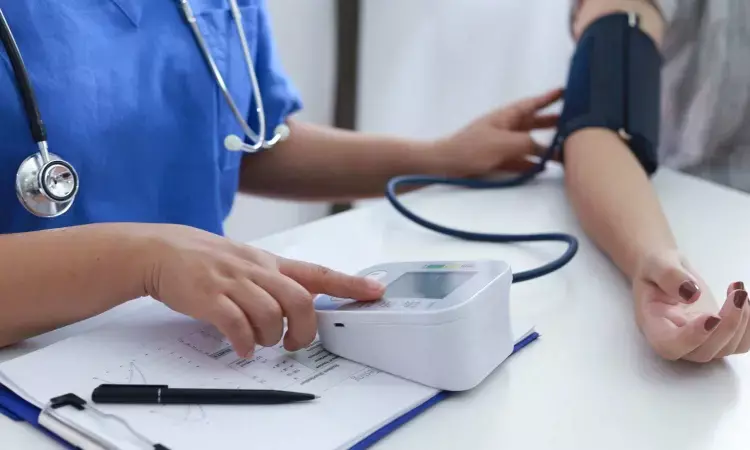- Home
- Medical news & Guidelines
- Anesthesiology
- Cardiology and CTVS
- Critical Care
- Dentistry
- Dermatology
- Diabetes and Endocrinology
- ENT
- Gastroenterology
- Medicine
- Nephrology
- Neurology
- Obstretics-Gynaecology
- Oncology
- Ophthalmology
- Orthopaedics
- Pediatrics-Neonatology
- Psychiatry
- Pulmonology
- Radiology
- Surgery
- Urology
- Laboratory Medicine
- Diet
- Nursing
- Paramedical
- Physiotherapy
- Health news
- Fact Check
- Bone Health Fact Check
- Brain Health Fact Check
- Cancer Related Fact Check
- Child Care Fact Check
- Dental and oral health fact check
- Diabetes and metabolic health fact check
- Diet and Nutrition Fact Check
- Eye and ENT Care Fact Check
- Fitness fact check
- Gut health fact check
- Heart health fact check
- Kidney health fact check
- Medical education fact check
- Men's health fact check
- Respiratory fact check
- Skin and hair care fact check
- Vaccine and Immunization fact check
- Women's health fact check
- AYUSH
- State News
- Andaman and Nicobar Islands
- Andhra Pradesh
- Arunachal Pradesh
- Assam
- Bihar
- Chandigarh
- Chattisgarh
- Dadra and Nagar Haveli
- Daman and Diu
- Delhi
- Goa
- Gujarat
- Haryana
- Himachal Pradesh
- Jammu & Kashmir
- Jharkhand
- Karnataka
- Kerala
- Ladakh
- Lakshadweep
- Madhya Pradesh
- Maharashtra
- Manipur
- Meghalaya
- Mizoram
- Nagaland
- Odisha
- Puducherry
- Punjab
- Rajasthan
- Sikkim
- Tamil Nadu
- Telangana
- Tripura
- Uttar Pradesh
- Uttrakhand
- West Bengal
- Medical Education
- Industry
New Canadian guideline focuses on managing hypertension in primary care

Assam Doctor’s Post Sparks Debate on Family Interference in Medical Care
A new guideline to diagnose and treat hypertension is aimed at helping primary care clinicians, including family physicians, nurses, nurse practitioners, and pharmacists, manage the disease. The new guideline, the first of 2 from Hypertension Canada, is published in CMAJ (Canadian Medical Association Journal) and will be republished with permission in Canadian Family Physician and Canadian Pharmacists Journal, with a summary in Canadian Nurse.
Hypertension is the most common modifiable risk factor for heart disease and death, affecting about 1 in 4 adults in Canada. Canada has been a leader in hypertension treatment and control, but this success has been on the downward trend in recent years. Discrepancies in optimal blood pressure targets, complex guideline recommendations, less engagement with front-line health care providers and other factors may be fuelling this decline.
“As primary care is where most hypertension is managed, supporting primary care practitioners to better diagnose and manage this disease will improve hypertension care at the population level and benefit people in Canada,” says Dr. Ross Tsuyuki, past president, Hypertension Canada. “We hope these practical recommendations will help with implementing hypertension care in everyday clinical practice.”
Developed by Hypertension Canada, the guideline uses the World Health Organization’s (WHO) HEARTS framework to improve cardiovascular health around the globe with an adaptable approach that can be tailored to countries’ unique needs. In the part of the United States where it was developed, it improved local hypertension control rates from 44% to 90% in just over a decade.
The guideline, based on the latest evidence, provides recommendations most relevant to primary care on assessing blood pressure (BP) and definitions of hypertension for diagnosis, healthy lifestyle changes, and pharmacotherapy for treatment, including hard-to-treat hypertension. In selecting medications to treat hypertension, the guideline committee considered efficacy, tolerability, cost, coverage, availability, protection from future drug shortages, and ability to split pills.
One important change is a lower threshold for BP targets.
“The lower BP thresholds adopted for both defining hypertension and treatment targets relative to previous Hypertension Canada guidelines means that more people will be labelled as having hypertension, which may have meaningful personal implications, like stigma, insurance coverage, and more,” says guideline co-chair Dr. Greg Hundemer. “However, the committee thought that the current evidence strongly supports the lower thresholds to promote early detection of, and intervention for, hypertension, which will help mitigate long-term cardiovascular complications at the population level.”
A committee of family physicians, pharmacists, a nurse practitioner, hypertension specialists, and a methodologist developed the guideline. In addition, 4 patient partners with lived experience of hypertension provided feedback during guideline development and helped create a patient support tool.
The guideline is the first of 2, with the second intended to be a comprehensive guideline to address more complex aspects of hypertension management.
“This guideline is not intended to be applied in all clinical scenarios, such as managing hypertension in children or in people who are pregnant or trying to become pregnant. Separate guidelines are available for these patient populations. Rather, it is a complement to an upcoming comprehensive guideline aimed to help with more complex and nuanced aspects of hypertension management, such as resistant hypertension, but should cover about 95% of most uncomplicated hypertension cases in the community,” says Dr. Rémi Goupil, guideline co-chair.
Reference:
Rémi Goupil, Ross T. Tsuyuki, Nancy Santesso, Kristin A. Terenzi, Jeffrey Habert, Gemma Cheng, Stephanie C. Gysel, Jill Bruneau, Alexander A. Leung, Norman R.C. Campbell, Ernesto L. Schiffrin and Gregory L. Hundemer, Hypertension Canada guideline for the diagnosis and treatment of hypertension in adults in primary care, Canadian Medical Association Journal, DOI: https://doi.org/10.1503/cmaj.241770.
Dr Kamal Kant Kohli-MBBS, DTCD- a chest specialist with more than 30 years of practice and a flair for writing clinical articles, Dr Kamal Kant Kohli joined Medical Dialogues as a Chief Editor of Medical News. Besides writing articles, as an editor, he proofreads and verifies all the medical content published on Medical Dialogues including those coming from journals, studies,medical conferences,guidelines etc. Email: drkohli@medicaldialogues.in. Contact no. 011-43720751


